For some time we'd been trying to see an oncologist at the Lombardi Center at Georgetown University Hospital. One oncologist in particular there had come very highly recommended from multiple independent sources, and another one looked very good as well. Before going to the Mayo, we were looking at Lombardi as a possible local version of a place like the Mayo or Johns Hopkins. But we were unable to get an appointment. Even though the recommendation Nadine received at the Mayo was not terribly different from what our first oncologist back home had recommended, we still thought it would be good to check out Lombardi - because it seemed to us that the doctors there might be a little more plugged in to the latest developments, and because we also need to think about long-term care (that's long term, as in decades!).
Thanks to the efforts of several people (to whom we are very grateful), we were finally able to get an appointment this Wednesday morning, the day before Nadine was scheduled to begin chemo. It paid off.
We were able to see the second of the two oncologists I mentioned, and just as with the surgeon we met with at Mayo, I would say that Nadine left with a very good feeling about her. My own opinion is that what sealed if for Nadine was when the doctor described how she would actively follow the effects of the chemo to see if the tumor was responding, and would tailor the approach accordingly. Most likely, Nadine will continue to have the chemo largely as already planned, but if for some reason a modification is advisable, the doctor would discuss this with us rather than just sticking to the standard approach regardless of how well or poorly it is working. That kind of hands on approach that takes into account what is actually happening for the individual patient is exactly what Nadine was looking for, and what she most likely would not have gotten if she'd stayed with our original oncologist. It's not so much that the first oncologist wasn't good - she was very nice and seemed very competent. It's that she seemed more rigid in her approach (and if you know Nadine, you know that just the mention of rigid will turn her off, even if in the end you do exactly what you had planned all along) and that when you find someone who resonates with what you want, and when they are in a good institution to boot, that's hard to top. It was the same with the local surgeon, someone Nadine has really good feelings about (after all, he's the one who found the cancer in the first place, and he was very proactive about it), but nonetheless will not be using. So, it's surgery at the Mayo, chemo and other local care at Lombardi.
For me it was important that the Lombardi oncologist was upfront about the fact that the adriamycin might well not have a dramatic effect given the nature of Nadine’s cancer. This was something that I already knew, but she talked about it even before I asked. She feels it is very important that her patients know what is and is not known, and that they not go in thinking they are getting a magic bullet. I appreciate that, and felt assured that we were dealing with a good doctor here. I think it was also reassuring to Nadine, because it gave her confidence that the doctor knew here stuff, was honest, and would work with us (and also because it was in this context that she talked about tailoring the therapy).
The Lombardi doctor did want to make one change to the chemo plan - to change from doing adriamycin every two weeks to doing it every three. The former is the current standard approach, and was recommended by both our original oncologist and the Mayo oncologist. However, the Lombardi doctor said that the pathology indicates that Nadine likely has a somewhat slower growing tumor, so that any potential benefits of the two week cycle revealed in large studies probably would not be apply in her case. She also said that the one study that really looked at this question did so in the context of also using a taxol, which she thought (based on a fairly large body of literature) was probably the real reason why the two-week cycle was better. Having looked into the literature pretty extensively by now, I see that it supports what she said (there is actually a second study, using epirubicin instead of adriamycin (both are "anthracyclines"), but it was also done in the presence of a taxane). There is nothing (that I can find at least) which would argue against her recommendation. So, Nadine has decided to go with the three week cycle.
She is also suggesting that we might change the approach to the taxane, which Nadine will be getting after she finishes with the adriamycin/cytoxan. She suggests that weekly taxol rather than biweekly taxol will likely work better. That was something I had only just became aware of, because a large study on the question was published just 8 days ago in the New England Journal of Medicine. It verifies what she is saying. Upon further research I found that there was a smaller study published a couple of years ago which came to the same conclusion. Obviously this is a doctor who has her ear to the ground and really does know the latest developments.
Next, it turns out the the Lombardi doctor is acquainted with Nadine’s ophthalmologist. This will only help when it comes time to do steroids (with the taxol), which might negatively affect Nadine's glaucoma. Whether we will do taxol, or a variant know as abraxane which requires a lower dose of steroids (this was suggested by the Mayo oncologist) has not yet been determined. The Lombardi doctor didn’t reject it, but nor did she embrace it, because there is much less experience with abraxane for use in pre-operative chemotherapy if the cancer has not spread beyond the local lymph nodes. However, she will be looking into it, and we have a few weeks to figure this one out.
Finally, we got a hard copy of the pathology report from the breast biopsy done at Mayo. Tissue was sample from two different location. In one location the cells were grade 1 and in another were grade 2 (on a three point scale). Grade 1 is the best prognostically, and we are very happy with this finding, as before we thought Nadine had a grade 2/3 cancer.
So, all in all, Wednesday was a good day.
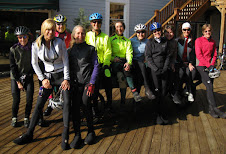

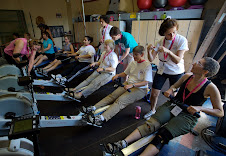
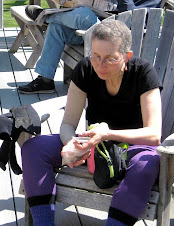



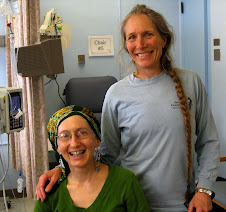

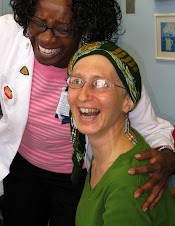



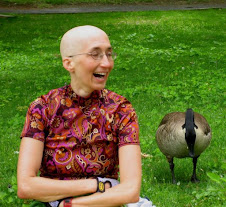
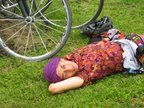



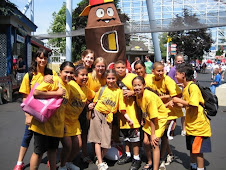

1 comment:
congrats on the dr. selection etc. you won't find many articles on this in the science journals i would bet, but i would bet that quality of patient-dr relationship is a significant factor (controlling for a threshhold level of dr. competency, of course!) in desirable medical outcomes. don't sell short the power of the body to do the fighting, and that depends on attitude, etc.
where are the rigorous studies measuring the impact of "karma"?!!
paz,
ty
Post a Comment